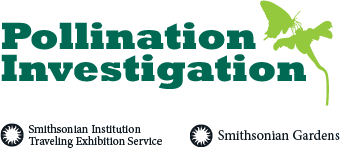Iredell Museums to Present Smithsonian Poster Exhibition Exploring Essential Role of Pollinators in the Natural world
Nearly 90% of flowering plants rely on approximately 200,000 species of animal pollinators for fertilization. Smithsonian Gardens and the Smithsonian Institution Traveling Exhibition Service present “Pollination Investigation,” a poster exhibition that explores the who, what, when, where, why, and how of pollination by interpreting the unique relationship between pollinators and flowers. The posters will be on view at Iredell Museums starting Friday, April 28.
“Pollination Investigation” showcases how pollinators are vital for a strong ecosystem as most plants need their help to fertilize flowers and reproduce. The exhibition features seven “pollinator profiles” for bees, beetles, butterflies, hummingbirds, flies, moths, and wind (along with special references to bats and water). Using a field-journal theme, each profile describes the pollinators’ favorite flowers based on floral characteristics encouraging exploration into flower shape, color, scent, and more. The set of 14 posters is bilingual (English and Spanish) and designed to educate and inspire people to explore the natural world looking at flowers and insects.
“Pollination Investigation” is distributed at no cost to schools, libraries, museums and community organizations. It was created by Smithsonian Gardens in collaboration with the National Museum of Natural History and made available by the Smithsonian Institution Traveling Exhibition Service. It is funded in part by the Smithsonian Women's Committee.
About Smithsonian Gardens
Since its inception in 1972, Smithsonian Gardens has extended the Smithsonian’s museum experience in a public garden setting, inspiring visitors with exceptional displays and educating them about horticulture, plants, the natural and build environments and artistic design. Its research and educational programs promote the ongoing development of collections of living plants, garden documentation and horticultural artifacts. Smithsonian Gardens is accredited by the American Alliance of Museums. For more information, visit the Smithsonian Gardens website.
About the Smithsonian Institution Traveling Exhibition Service (SITES)
SITES has been sharing the wealth of Smithsonian collections and research programs with millions of people outside Washington, D.C., for more than 65 years. SITES connects Americans to their shared cultural heritage through a wide range of exhibitions about art, science, and history, which are shown wherever people live, work and play. For exhibition description and tour schedules, visit sites.si.edu.
“Pollination Investigation” showcases how pollinators are vital for a strong ecosystem as most plants need their help to fertilize flowers and reproduce. The exhibition features seven “pollinator profiles” for bees, beetles, butterflies, hummingbirds, flies, moths, and wind (along with special references to bats and water). Using a field-journal theme, each profile describes the pollinators’ favorite flowers based on floral characteristics encouraging exploration into flower shape, color, scent, and more. The set of 14 posters is bilingual (English and Spanish) and designed to educate and inspire people to explore the natural world looking at flowers and insects.
“Pollination Investigation” is distributed at no cost to schools, libraries, museums and community organizations. It was created by Smithsonian Gardens in collaboration with the National Museum of Natural History and made available by the Smithsonian Institution Traveling Exhibition Service. It is funded in part by the Smithsonian Women's Committee.
About Smithsonian Gardens
Since its inception in 1972, Smithsonian Gardens has extended the Smithsonian’s museum experience in a public garden setting, inspiring visitors with exceptional displays and educating them about horticulture, plants, the natural and build environments and artistic design. Its research and educational programs promote the ongoing development of collections of living plants, garden documentation and horticultural artifacts. Smithsonian Gardens is accredited by the American Alliance of Museums. For more information, visit the Smithsonian Gardens website.
About the Smithsonian Institution Traveling Exhibition Service (SITES)
SITES has been sharing the wealth of Smithsonian collections and research programs with millions of people outside Washington, D.C., for more than 65 years. SITES connects Americans to their shared cultural heritage through a wide range of exhibitions about art, science, and history, which are shown wherever people live, work and play. For exhibition description and tour schedules, visit sites.si.edu.
